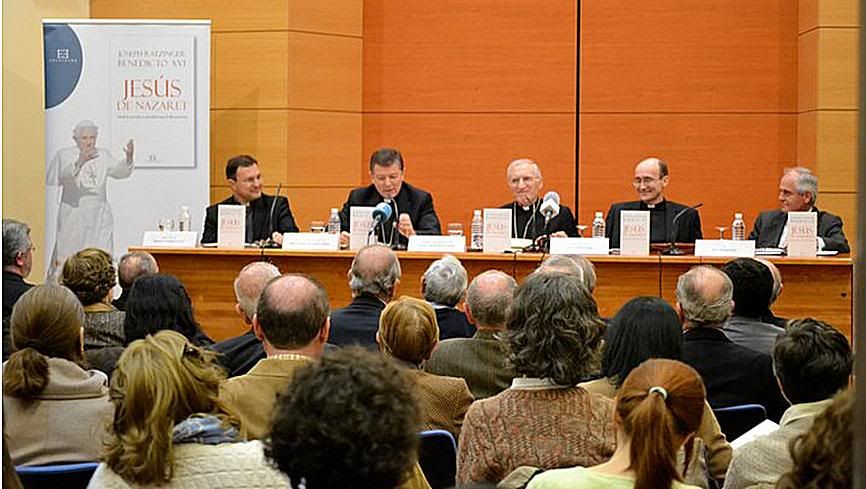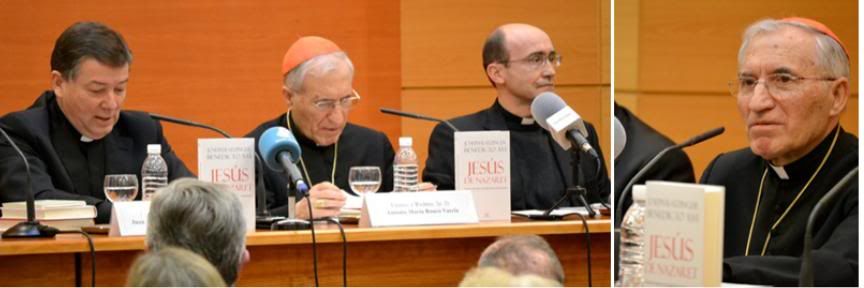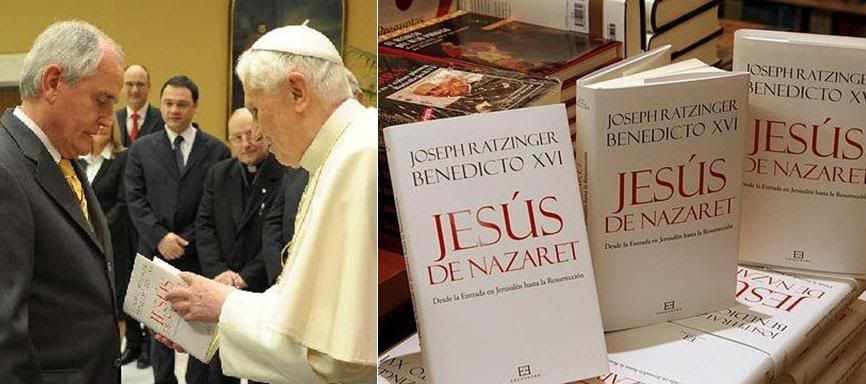

 See preceding page for earlier entries today, 4/2/11.
See preceding page for earlier entries today, 4/2/11.

 Reading JON-2:
Reading JON-2:
Being with the Father, Jesus is always with us -
'present throughout history and in every place'
by Carlo Di Cicco
Deputy Editor
Translated from the 4/2/11 issue of

Joseph Ratzinger/Benedict XVI's new book makes Jesus of Nazareth our contemporary.
In the great disorder that reigns on earth today, the irruption of such a fascinating book prompts questions that touch the profundity of our unease. Each one can find in it a guiding light out of that unease.
Volume II recounts the three days that are crucial in the earthly existence of Jesus, his last hours of life marked by his Passion and death. The start of a new time - with the Resurrection - a true watershed in history that originated an alternative perspective on the future of the world and of human hopes.
The author is convinced that a positive confrontation with Jesus of Nazareth can be a solution rather than a problem for mankind. His investigation is convincing, reasonable and respectful of different cultures and viewpoints.
To be interested in Jesus, makes sense, the book tells us, in effect - because he is the only person in history who resurrected from the dead, the Living One who is immersed in all the ages of the world and therefore, in our present - a reliable travelling companion who introduces us to the unknown horizons of life after death.
Whoever would want to understand this mysterious Lord should reflect on the final days of his earthly life.
Page after page, from the words and actions of Jesus, the theologian who became Pope carries the anchors of what it means to be a Christian.
On the one hand, he links the Nazarene's experience of suffering, of anguish and of tenderness, with all the tears and immeasurable pain of all victims in all times; and on the other, he helps us to read fragments of the mystery of evil and suffering which are no longer invincible after his agony on the Mount of Olives and his total abandon on the Cross.
The resurrection of Jesus is not a belated flight of fancy by disciples who, unable to forget him, transformed him into a myth. It is a reality that actually happened, just like his crucifixion and his death.
But while we have experiential knowledge of the pain and death kneaded into history, our knowledge of the Resurrection is that of faith. A reasonable faith, but still faith.
Papa Ratzinger reminds us that Christian faith is founded on the Resurrection. Because it is so closely connected to the Cross, the memory of the Resurrection is 'dangerous' for human knowledge. [???]
For the disciples who had expected a regal and triumphant Messiah, the death of Jesus was an overwhelming loss. But the resurrection, once they had confirmed it, changed their perspective, and so they decided to follow the Master whom they finally understood for what he was - the Son of God.
The mystery of Christ's passion, death and resurrection, the author reminds us, contains some of the most profound existential questions/
In the trial of Jesus, we see a radical criticism of politics based on deceit and violence rather than on truth. The destiny of the world depends on truth, not on power which remains an illusory solution.
To interest ourselves about Jesus is to be interested in that destiny, because he came to earth to give the most authoritative testimony of truth which Christian teaching identifies with God.
In the style of the Fathers of the Church, Papa Ratzinger does not write for intellectual pleasure, but offers a book for life. Reading his JESUS books immerses us in the depths of the Christian mystery, revealing to us how little it is known and savored.
In choosing to interpret the accounts of the Passion based on both historical research and faith - that are not opposites but complementary - the author confirms the theology of the Council and puts an end to the prejudice against the Jewish people who had been accused for centuries of deicide.
In the various episodes he examines - from the entrance into Jerusalem to the Resurrection - Benedict XVI uses a new and accessible language without sacrificing depth.
He calls the Church 'the community of disciples'; he defines charity as 'concerned attention for others', not a second compartment of Christianity next to worship, "but rooted in the worship of God and part of it".
He evokes great emotion about the struggle between good and evil in Gethsemane when Jesus "elevates our recalcitrant nature to become its real self".
The Ascension is translated into the 'permanent nearness' of Jesus to us, an 'entering into the mystery of God", another dimension of being.
And he describes the Resurrection as a totally new phenomenon, a new dimension of being human, a decisive mutation, a qualitative leap, a new kind of future for men, a new dimension of human existence encompassed in the act of giving one's life.
Love and the resurrection, the author insists, are the two distinct motivations for being Christian. The Resurrection as a 'genetic mutation' fulfilled by God in Jesus and promised to everyone. Love as a way of life that distinguishes the children of God and which opens up for the cosmos a future of hope.
 Cardinal Rouco Varela presents
Cardinal Rouco Varela presents
JON-2 in Madrid:
'A precious tool for catechism'
Translated from the 4/1/11 issue of


MADRID, April 1 - "It is a magnificent book of spiritual reading and a catechetical-philosophical instrument that will help in the ministry of the faith and in religious dialog. It is a work that is particularly moving because it is born at a time of full maturity in the Pope's spiritual life".
These are among the remarks made by Cardinal Antonio Rouco Varela, Archbishop of Madrid, presenting Benedict XVI's JESUS OF NAZARETH- Vol. II in the Spanish capital Wednesday evening, at the San Damaso Faculty of theology.
After recalling that Joseph Ratzinger, before he became Pope, "had always wanted to write about Jesus Christ", the cardinal underscored that the Pope's Jesus books "invite the reader to know the totality of his person, to meet the man who was Jesus so that those who read the book may get to know him".
The cardinal observed that the theologian Joseph Ratzinger had always thought of the student of theology as someone "who has a life touched by the great questions, a life that is in need of help. And therefore, to this end, he is served by getting close to the figure and the message of Christ, without intellectual malice or fundamental doubts, in order to know the truth, the reality of faith and reason, and get to the heart of Christ".
All this, he said, "gives us one key to comprehending this book."
It helps to read the book, he added, with some idea of theological and critical exegesis of Scripture. He considers it "an instrument that contributes to the consideration of philosophical problems and helps us to appreciate his form and manner of exercising the ministry of the Word, in bearing witness to the faith, in the dialog with other religions, as well as with the world of professors who find it difficult to wean themselves away from intellectual theologies that are 'pre-historic'."

Also taking part in the presentation were Mons. Juan Antonio Martínez Camino, Auxiliary Bishop of Madrid, and secretary-general and spokesman of the Spanish bishops' conference; Ignacio Carbajosa, professor of Scripture at San Damaso; and Jose Miguel Oriol, president of Ediciones Encuentro, which published the Spanish edition of the book.
Oriol met the Pope at the Vatican on March 9, when, after the General Audience, the Pope gave an audience to the publishers of his book from various countries.

Also present was the dean of San Damaso, Javier Prades, who recalled the address given by Cardinal Ratzinger at the Pontifical Lateran University in October 2008 at an international conference to mark the 10th anniversary of John Paul II's encyclical
Fides et ratio. He said the Pope's new book was "an instrument for us to grow in the loving knowledge of Christ".
Mons. Camino, commenting on the structure imposed by the Pope on his book, said the Pope noted properly how "when he Jesus preached, he spoke of the Father and the Creator but not of the Son".
He also noted the 'double distance' - that between Jesus and the New testament, and between the New Testament and our time - two gaps that scientific knowledge seeks to bridge.
He said historico-critical exegesis "would reconstruct for us the true historical Jesus, which, according to theological-philosophical understanding, is also the Jesus of faith".
However, he also notes that in the Pope's book, there is "a new direction, which is the result of his long search for the face of God in Jesus of Nazareth": the structuring of the book through its canonical historico-critical exegesis, completes scientific knowledge with the hermeneutic of faith, where Scripture is not merely an epilogue to historical texts".
Its true objective, he said, is to provide "a living encounter with Jesus and the essence of Christianity".
For Prof. Carbajosa, the book "contributes many new things to the totality of modern exegesis", and develops its originality along two axes: its methodological foundation and the practical exercise of canonical exegesis.
[Modificato da TERESA BENEDETTA 03/04/2011 04:29]